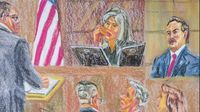In a notable ruling on July 7, 2025, a federal judge in Denver, Colorado, fined two attorneys representing MyPillow CEO Mike Lindell for submitting a legal brief riddled with errors generated using artificial intelligence. The U.S. District Court's Judge Nina Y. Wang ordered Christopher Kachouroff and Jennifer DeMaster to each pay $3,000 in sanctions after their February 25 court filing contained nearly 30 defective citations, including references to non-existent cases and misquoted legal precedents.
The problematic brief was filed in the defamation lawsuit brought by Eric Coomer, a former director at Dominion Voting Systems, who accused Lindell of defaming him by spreading baseless conspiracy theories that he helped rig the 2020 presidential election. The case, which began in May 2022, culminated in a June 2025 jury verdict awarding Coomer over $2.3 million in damages after finding Lindell and his media company FrankSpeech liable for defamation.
Judge Wang’s order highlighted the severity of the errors, noting that even the "corrected" version of the brief still contained substantive mistakes. "Legal principles that simply do not appear within such decisions" were cited, indicating either misuse of generative AI or gross carelessness by the attorneys. The judge was not convinced by the defense's claims that the errors were inadvertent, citing "contradictory statements and the lack of corroborating evidence" as reasons to impose sanctions.
Kachouroff admitted during a pretrial hearing that he initially drafted the motion and then "ran it through AI." When questioned about checking the citations after AI processing, he confessed, "Your Honor, I personally did not check it. I am responsible for it not being checked." DeMaster, who was delegated the task of citation checking, also faced sanctions. The court found no satisfactory explanation from either attorney on how the faulty citations appeared absent AI use or gross negligence.
Judge Wang described Kachouroff’s attempts to shift blame for the erroneous filing as "troubling and not well-taken," and rejected claims that the court was trying to "blindside" the defense. The judge emphasized that the sanctions were the "least severe sanction adequate to deter and punish defense counsel in this instance," underscoring the court's reluctance to penalize attorneys but the necessity of upholding professional standards.
Importantly, the sanctions did not extend to Mike Lindell himself. Kachouroff informed the court that Lindell was unaware of the attorneys’ use of AI in preparing the legal documents. Lindell, who has publicly asserted his belief in election fraud claims, lost the defamation case after the jury found that he made multiple false and defamatory statements about Coomer, including calling him a "traitor" and accusing him of orchestrating "the biggest crime this world has ever seen."
During the trial, Lindell’s defense did not present evidence to prove the election was rigged or that Coomer engaged in criminal activity, instead arguing that it was immaterial whether the claims were true, so long as Lindell believed them. Despite the jury’s ruling against him, Lindell has stated he plans to appeal the decision but also admitted to 9NEWS that he lacks the $2.3 million damages awarded to Coomer, citing bankruptcy and significant personal financial losses from backing his election fraud theories.
The court filing that triggered the sanctions was an opposition to Coomer’s motion seeking to exclude certain evidence, which was partially granted before the trial began. The brief’s nearly 30 defective citations ranged from failing to include basic court information to citing entirely fictitious cases, with legal ethics experts calling the errors "egregious."
This case is a stark example of the challenges and risks associated with integrating artificial intelligence into legal practice. While AI tools can assist attorneys with drafting documents and research, this incident illustrates how reliance on AI without thorough human oversight can lead to significant professional missteps.
Judge Wang’s ruling serves as a cautionary tale, reinforcing the judiciary’s expectation that attorneys uphold rigorous standards of accuracy and diligence, regardless of the tools they employ. The judge’s firm stance on the issue reflects broader concerns within the legal community about maintaining ethical responsibilities amid rapidly evolving technology.
As AI continues to permeate various professions, including law, this case underscores the importance of balancing innovation with accountability. For now, Kachouroff and DeMaster face fines and potential disciplinary proceedings, while Lindell’s legal battles continue to unfold amid intense public scrutiny.






